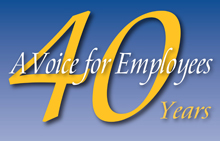Campus News
November 24, 2010
Employee Council celebrates 40 years

Emory’s Employee Council is celebrating 40 years as a voice for Emory employees, commemorating this anniversary with a communications campaign around campus.
“We are here to serve as a voice for our colleagues. In turn, that voice also allows the Employee Council an opportunity to make Emory a better place,” says current president Angie Duprey about the advisory group that facilitates communication between Emory employees and the University administration.
To acknowledge this milestone, the Oct. 20 meeting of the council featured a panel of three past presidents discussing some of the notable events during their tenures.
Ron Foust, who was president in 1999, noted there were “twice as many people here as in 1999 at the meetings . . . the campus has changed a lot with regard to sustainability and I think that’s good.” Foust added, “Priorities will only be set if you say it's important.”
“The two things I remember most about being president,” said Linda Sheldon, who led the Employee Council from 2006-2007, “is what a phenomenal organization it is, and that it is one of the most diverse group on campus, representing more ideas and more different types of lives.”har
Sheldon, manager of accessible design and construction in Campus Services, noted that the idea for the Hardship Fund was conceived under her tenure when “we discovered two people working at Emory and sleeping in their cars.” She noted that it coincided with the beginning of the financial crisis, and the idea for the fund met some resistance “because it’s complex and difficult to do.”
The Hardship Fund gathered momentum to its inception under Matt Engelhardt’s presidency, 2008-2009. “The Employee Council can get work done through committee work,” Engelhardt said.
At the Oct. 20 meeting, John Kosky of Emory’s WorkLife Resource Center provided an update on the Hardship Fund’s status:
• Employees had contributed nearly $20,000 through mid-November.
• 22 people had received awards from the Hardship Fund.
An initiative under Duprey is the discussion of hot topics — issues that employees are talking about. Employees can submit a question, concern or suggestion on the Hot Topics portion of the Employee Council website. One of these topics, a smoke-free campus, is generating a lot of heated discussion, one council representative said.
The University Senate is studying the feasibility of a tobacco free campus initiative with a committee headed by Theresa Milazzo of Human Resources.
Provost Earl Lewis, who spoke at the Oct. 20 meeting, said the issue was complex with, among other aspects, different cultural expectations.
Duprey also reminded members of the council’s food drive, running through Dec. 16. Collection bags from the council’s partner, the Atlanta Food Bank, will be placed throughout campus.
